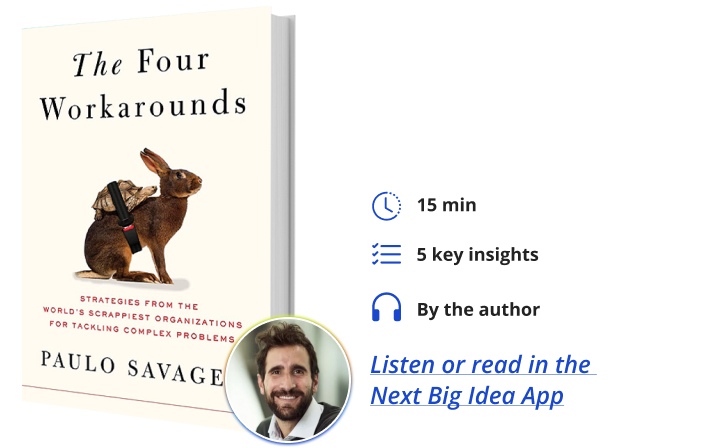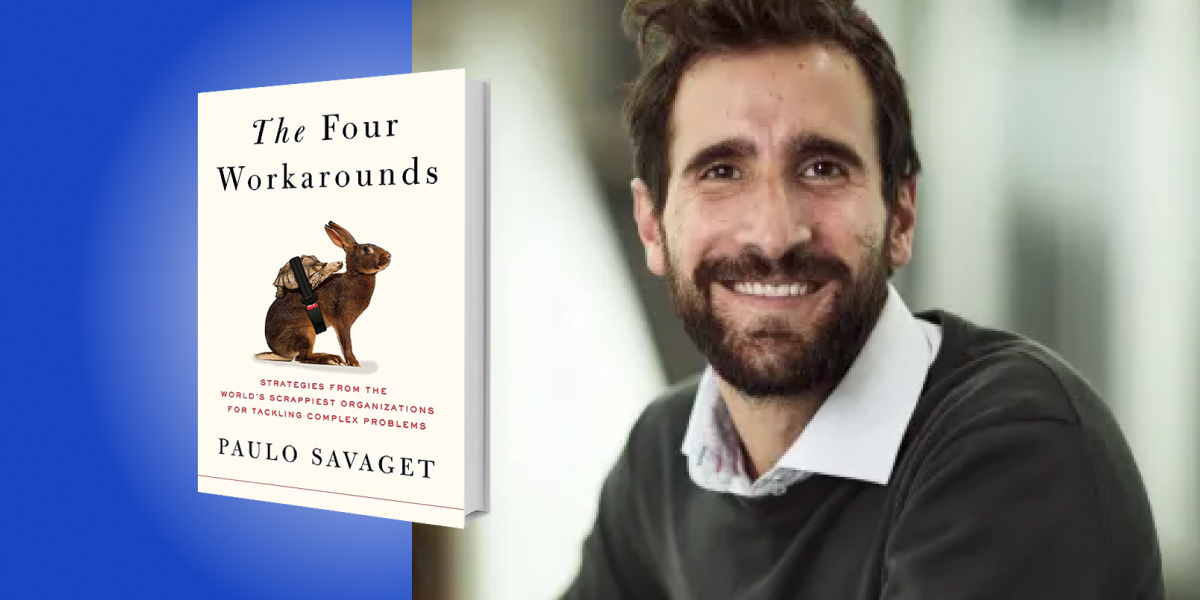Paulo Savaget is an associate professor in the Department of Engineering Science and Saïd Business School at the University of Oxford. He specializes in entrepreneurship, sustainable development, systems change, and innovation management.
Below, Paulo shares five key insights from his new book, The Four Workarounds: Strategies from the World’s Scrappiest Organizations for Tackling Complex Problems. Listen to the audio version—read by Paulo himself—in the Next Big Idea App.

1. Workarounds can achieve massive wins with minimal financial resources.
A workaround is an effective, versatile, imperfection-loving, problem-solving approach that thrives when stakes are high, resources are scarce, and there’s no time for the usual drawn-out decision-making process. At its core, a workaround is a method that ignores or even challenges conventions on how, and by whom, a problem is meant to be solved. For example, in Zambia, many medicines cannot be found in remote regions of Sub-Saharan Africa because of hard-to-solve bottlenecks in healthcare, such as poor infrastructure. This is the case even for cheap, over-the-counter medicines, such as diarrhea treatment.
ColaLife, an organization of only two staff, Simon and Jane Berry, worked around poor healthcare infrastructure in Zambia by piggybacking on Coca-Cola’s distribution channels. They realized Coca-Cola can be found even in the remotest places on earth, so why can’t diarrhea medicine take a free ride with soda bottles? The couple designed a triangular package containing diarrhea treatment to fit between bottles in Coca-Cola crates and raised funds to test their idea in an exploratory trial in Zambia. As they engaged with Coca-Cola and its bottler in Zambia, SAB Miller, they shifted their plans from merely inserting medicine into the crates of Coca-Cola to making use of the entire system of relationships that made the distribution of fast-moving consumer goods so effective. By tapping into the success of fast-moving consumer goods to address a healthcare problem, Jane and Simon Berry worked around obstacles preventing access to medicines in remote regions of Zambia, saving thousands of lives.
Workarounds can address all sorts of problems, ranging from global responses to some of the world’s toughest challenges, such as global pandemics, gender inequality, poverty, or everyday inconveniences. There are four workarounds, and each uses a different attribute.
2. The piggyback workaround.
The piggyback workaround enables us to circumvent all sorts of obstacles and address our problems by using seemingly unrelated relationships. This workaround leverages what is already present in an ecosystem.
You may have heard about micronutrient deficiencies, also known as “hidden hunger,” which impair intellectual and physical development. Lesser-known is that a common solution to this problem is piggybacking on foods that people eat regularly. Dietary habits are incredibly tough to change, especially on the scale and at the speed necessary to save lives. Approximately nine percent of the global population is chronically undernourished, and 22 percent of children experience stunted growth because of poor nutrition. So why not piggyback nutrients onto what already reaches people’s mouths?
Food fortification became common practice in 1924 when Michigan started tackling goiter through iodized salt. By the 1930s, goiter caused by iodine deficiency had been virtually eliminated from the country’s healthcare concerns. This piggyback is so effective that over six billion people in over a hundred countries consumed iodized salt in 2021—this is the equivalent of almost 90 percent of the world’s population. Other examples of food fortification include adding iron, folic acid, zinc, and vitamin A to staples such as wheat and ready-to-eat cereals. Eighty-six countries today mandate at least one kind of cereal grain fortification, and many food manufacturers, such as Nestlé, started fortifying their products voluntarily.
“Scrappy organizations operating from the fringes of power tend to have an advantage when it comes to spotting unconventional pairings.”
It was also through a piggyback that then-scrappy Airbnb took off without spending a dime on ads. In 2017, Airbnb had more listings worldwide than the top five hotel corporations combined, an astonishing accomplishment for a company that started in 2010, when two designers offered lodging with three air mattresses in their loft in San Francisco. In the company’s early moments, its target audience, people who needed lodging but didn’t want to stay in hotels, was on Craigslist, which had a massive user base, but fell short when it came to user experience. Airbnb then started to poach Craigslist users by piggybacking on its rival’s platform. Every time an Airbnb host created a listing, Airbnb sent them an email with a publishable link that enabled the user to automatically cross-post the same listing on Craigslist to increase their listing visibility. When someone surfing on Craigslist found a listing that originated on Airbnb, they would click on a link that rerouted them to Airbnb’s platform. This meant free site traffic and new sign-ups for Airbnb.
As Airbnb’s listings were far superior (they offered professional photography services for their listings, a more user-friendly experience, and personalized ads), users started going straight to Airbnb, ignoring Craigslist for their lodging needs. With this piggyback, Airbnb quickly gained a portion of Craigslist’s market share, and, when Craigslist realized what was going on and disabled Airbnb’s cross-posting, the new upstart had already outcompeted its rival.
The piggyback is a workaround that makes use of relationships, social, commercial, technological, or otherwise, that already exist. Scrappy organizations operating from the fringes of power tend to have an advantage when it comes to spotting unconventional pairings. There’s much missed value that falls between the cracks in our siloed structures. In addressing your own challenges, I suggest you look between silos rather than in them, and think of how the successes of others can be used for your own benefit.
3.The loophole workaround.
The loophole workaround either capitalizes on ambiguity or uses an unconventional set of rules when they are not the most obviously applicable. We often think of loopholes as inherently negative schemes that benefit the powerful. Most of us have heard about the tricks the richest one percent in the world use to avoid taxes, such as hiding fortunes in tax havens like the Cayman Islands, a country that houses more offshore companies than people. What we fail to note is that loopholes also work for those of us who are neither rich nor famous.
Women on Waves, a feminist pro-choice group, for example, offers legal and safe abortion services to people living in countries where abortion is illegal. People choose to terminate their pregnancies on board one of the Dutch ships in international waters. Why? Because on board a Dutch ship in international waters, the pro-choice legislation of the Netherlands applies. The organization uses the fact that what constrains people’s access to legal abortion is not their nationality but the law in the jurisdiction where they live.
Another example is an indebted housekeeper who legally dodged the bank that was extorting her with abusive interest rates by transferring her assets to relatives, leaving nothing behind for the bank to confiscate. Or when many LGBTQI+ couples marry in foreign countries and later validate their marriage certificates in their home countries, where same-sex marriage is illegal.
“With some creativity and close attention to what rules do (and don’t) say we can benefit from their inadequacies to circumvent or otherwise avoid their purpose.”
These cases remind us that we often find ourselves constrained or even trapped by pre-existing rules. However, there’s more than one way to be right, and simply following or breaking rules isn’t always the best way to get something done; often there is an option that lies in between. With some creativity and close attention to what rules do (and don’t) say we can benefit from their inadequacies to circumvent or otherwise avoid their purpose. This is especially appealing when we don’t have the power or resources to change things, or we don’t have time to wait for things to change because the need is too urgent.
As you search for loopholes, try it from two different angles. First, you can make use of a different, more favorable set of rules than the status quo. When zooming out of what constrains you and focusing instead on less common types of rules or paths less taken, you may find loopholes to get what you want in a technically right but unconventional way. Second, you can look more closely at the specific performance of the rules you find restrictive to either void them or make their enforcement impossible. This task involves the analysis of the ambiguity of the rules and the circumstances under which they can, or cannot, be enforced.
4. The roundabout workaround.
The roundabout workaround disturbs and redirects self-reinforced behaviors, behaviors that are very common in our lives. For example, a child might experience the impact of this principle when they fight with a sibling. If the first sibling flicks the second, the second sibling pulls the first. Then the first throws a punch, and the fight escalates so quickly that instants later, both find themselves wrestling on the floor trying to choke each other. In these situations, when we feel things are spiraling out of control, and we can go in only one direction, a roundabout workaround works as a sort of stopgap. It allows us to take cover from a problem, buy time until tough issues are resolved, delay assessment to increase the chances of success, or resist continuous oppression. In some cases, roundabout workarounds may even drastically shift the status quo, turning a vicious cycle into a virtuous one.
Some roundabout workarounds are familiar to all of us. Social distancing during the Covid-19 pandemic allowed us to buy time and avoid unsurmountable pressure on healthcare systems while we developed vaccines. Employees who invented some of our most beloved products, like the large-screen display monitor, aspirin, and the blue LED lighting, worked around corporate rules to experiment more freely until their invention was ripe to be revealed to their superiors. Homeowners in India, frustrated with men urinating on their walls, curbed this practice by placing tiles of Hindu gods on their walls; after all, urinators wouldn’t commit such a heresy.
Once in motion, normalized situations may seem difficult to disrupt, but disruption is precisely what roundabout workarounds offer. Here, we can learn from Scheherazade, the legendary Persian queen who used a series of workarounds to change the course of a seemingly inevitable fate bestowed upon her by her husband, King Shahryar. The story goes that Shahryar discovered that his first wife had cheated on him, and he came to believe that all women would betray him. After having that wife executed, the king decided to marry a new virgin every day and have her beheaded in the morning, before she had the chance to dishonor him.
Then the king married Scheherazade. She had a gift for telling stories that left the listener enthralled and able to forget reality, if only for a moment. Once in the king’s chambers, Scheherazade asked if she could bid one last farewell to her beloved sister, who had secretly been instructed to ask Scheherazade to tell her a story. The king lay awake, listening with awe to Scheherazade’s story until dawn, when she broke off at an exciting moment. Riddled with curiosity, the king delayed her execution: he insisted on hearing the rest of that story. She used her captivating storytelling method to work around the inescapable authority of the king on that night and repeated the same workaround for 1,001 nights, thus successfully delaying her beheading one day at a time. With her indirect resistance, Scheherazade flipped the power equation: By the time she finished her thousandth story and said she had no more to tell, the king had fallen in love and decided to spare the life of the woman who had by that time borne him three children.
“Once in motion, normalized situations may seem difficult to disrupt, but disruption is precisely what roundabout workarounds offer.”
The fictional Scheherazade, the godmother of roundabout workarounds, teaches us that pivotal change stems from effectively accumulating and leveraging small, temporary interventions. Like Scheherazade, you too can stack workaround on top of workaround, night after night, imperceptibly but definitively changing the course of what at first appears inevitable.
5. The next best workaround.
The next best workaround focuses on repurposing or recombining resources, which can range from tangible to intangible, and from the most high-tech to the most basic. The key is to focus on alternatives that are available but largely ignored, as well as the different and unconventional affordances or assemblages of resources at your disposal.
If you watched On the Basis of Sex, the biographical legal drama about RBG, you’ll have seen how by arguing from the position of a man’s diminished rights in front of all-male judges, RBG and her husband successfully set a historic precedent that unequal treatment on the basis of sex is unconstitutional. They chose the seemingly low-stakes case of Charles Moritz. If Moritz were a woman, he would have been entitled to a tax deduction for a caregiver’s expenses, but the law didn’t consider the case of a single man caring for his elderly mother. By winning this case, RBG exposed the broader sexism in US laws that afflicted women the most, creating precedents to press for changes in laws in Congress and to contest many court decisions that discriminated against women.
Like RBG, scrappy organizations all over the world repurpose available resources with creativity and ingenuity. For that, they often search for the extraordinary potential of mundane resources. This is what engineer Topher White did when he repurposed discarded cell phones to address illegal logging. He noticed the difficulties for guards and rangers to hear and pinpoint where logging is occurring in protected areas; these areas are massive, and often in regions that do not have vast human and technological resources. He then repurposed old cell phones to record the sounds of the forest in a three-kilometer radius. The phones are charged with solar energy and put in protective boxes hidden up in tree canopies, distributed across the rainforest to maximize coverage. Then artificial intelligence analyzes the sounds and distinguishes between chainsaw noises and the sounds of the forest, such as birds chirping, the falling rain, and trees swaying in the wind. As the phones are connected to a network, when they record chain saws, they send a real-time alert with the location of the logging to rangers and community patrols, who can catch the loggers in the act.
These cases show us that the best step forward is not focusing on what the ideal ought to be, but instead drawing attention to available opportunities that tend to be ignored. Resources are almost always at our disposal, even if they’re present in ways we tend to disregard or that challenge our way of thinking. Sometimes, these small flickers from creative, intermediate patches wind up illuminating entirely new opportunities.
To listen to the audio version read by author Paulo Savaget, download the Next Big Idea App today:
































